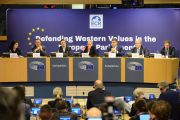
In an interview with Austrian news site Exxpress, Hungarian Foreign Minister Péter Szijjártó urge for an end to all Western military aid to Ukraine, stating that the massive inundation of arms, together with Kyiv’s hesitancy about peace talks with Moscow, has made peace impossible.
When questioned what should be done to attain a ceasefire in Ukraine, Szijjártó said ending foreign arms shipments to Kyiv should be a top priority.
“The more weapons that are supplied, the longer the war lasts. And the longer the war lasts, the more people will die,” the minister added. “It is obvious that what has been done so far has not been successful. Many weapons were delivered, but the war was only prolonged. A lot of money has been paid to Ukraine, but the destruction of Ukraine continues.”
Asked about the possibility that Russian troops would “march all the way to Kyiv” if Ukraine is left “defenseless,” Szijjártó replied that such a situation could only be avoided with negotiations and a renewed peace process.
“This should be prevented by ending the war now. As long as that doesn’t happen, the war threatens to intensify further and more people risk dying. The war should have ended yesterday,” he said.
Szijjártó proceeded to campaign for more dialogue between Russia and Ukraine, saying “the most important requirement is to keep communication channels open.” The Hungarian politician pointed out that he is often “insulted by many European colleagues, and by Brussels” after meetings with his Russian counterpart, but said “there is no hope at all for peace” sans negotiations.
Western sanctions have also failed to “bring the Russian economy to its knees” as planned, the Hungarian minister said, implying that such embargoes had backfired and did not bring an end to the fighting.
Budapest is among a small number of EU countries that have refused to join the Western sanctions campaign or supply arms to Ukrainian forces, choosing instead to maintain ties with Moscow. Notwithstanding pressure from other members in the bloc, Hungarian Prime Minister Viktor Orbán has refused to authorize Brussels’ latest aid package to Kyiv, holding up the funds since December.
Orbán also threatened to veto Ukraine’s accession to the EU, contending that Ukrainian membership poses many risks to the bloc and its economy, as well as the fact that Kyiv is still “at war.”
The aforementioned EU deadlock comes at a time when Ukraine’s largest Western backer, the United States, has run out of aid money, as a $61.4 billion spending package remains stalled in Congress. Ukrainian Foreign Minister Dmitry Kuleba has admitted that Ukraine has no “plan B” should the funds run out, saying there is no alternative to U.S. funds.
On January 15, Szijjártó met with his Austrian counterpart Alexander Schallenberg and others in Vienna to start a series of consultations meant to set the political groundwork for the presidency of the Council of the EU Budapest is poised to assume in the second half of this year.
Following his meeting with Schallenberg, Szijjártó explained his decision to begin consultations in Vienna, telling the press, “I am in the Austrian capital … so that the Hungarian presidency of the EU is successful in the most important priorities.”
Also, Szijjártó highlighted that Hungary could depend on Austria “to a great extent” to back its presidency’s two main priorities: combating illegal migration and expediting the accession of Western Balkan countries into the EU. Austria, Szijjártó elaborated, is one of the few EU countries that has consistently employed action against illegal migration.
“This is how we Hungarians are. We have already made it clear countless times: a sharp political change is needed in Brussels so that the European Union does not attract but stops illegal migrants,” the Hungarian minister stated.
Hungary’s objective, Szijjártó declared, is to make EU regulations finally abide by and maintain international law, which states that refugees are entitled only to stay temporarily in the first safe country they reach. Nonetheless, asylum seekers from the Middle East and North Africa frequently pass through various “safe countries” before they eventually settle in a high-income, Western EU member state with social welfare.
Rather than attract migrants with loose asylum laws and generous social benefits, EU member states should help would-be migrants in their own countries with investments, development, and training, the Hungarian diplomat argued.
Besides, Szijjártó reminded the press that Hungary, as a front-line EU member state, has sufficient experience in successfully tackling illegal migration. If Hungary had not spent billions of euros to effectively control its southern border, he continued, tens of thousands of illegal migrants, and perhaps more, would have already reached Europe, further jeopardizing EU security, increasing the risk of terrorism, and leading to the formation of parallel societies.
Regarding the EU’s long-stalled enlargement into the Western Balkans, Szijjártó highlighted the need to renew and bolster efforts to incorporate Serbia and other Western Balkan countries into the bloc.
During the meeting, both Hungarian and Austrian foreign ministers discussed bilateral issues, with Szijjártó underscoring that Austria continues to be a dependable partner in matters linked to energy supply, noting that over 20 percent of Hungary’s annual gas consumption is supplied via Austria. Unlike many EU member states, both Hungary and Austria, Szijjártó said, view energy supply as a practical matter instead of an ideological issue.
Despite Szijjártó not mentioning it in this particular meeting, Hungary also plans to tackle Europe’s demographic challenges and boost the bloc’s competitiveness in the global market. Judit Varga, Fidesz’s president of the European Affairs Committee of Parliament, outlined these plans in a meeting in Belgium with national parliamentary EU committee chairmen.
On January 12, MEP Petri Sarvamaa of Finland declared that about 120 members of the European Parliament in Strasbourg had signed a petition to deprive Hungary of its voting powers in the EU.
Article 7 permits the bloc to suspend a member for “persistently breaching” the bloc’s values such as human rights, democracy, equality, and the rule of law. If a third of the members of the European Commission and a two-thirds majority in the 705-member Parliament agree, a “qualified majority” can suspend a member’s rights, including the vote in the European Council.
Sarvamaa lambasted Orbán for holding the EU “hostage” over aid to Ukraine and maintained that stripping him of his rights was the “only way to protect the values of the European Union and ensure the functioning of decision-making processes” in the alliance.
“It would also be sending a message to all Member States that the EU will not tolerate any backsliding on the Rule of Law or disrupting the principle of sincere cooperation,” he said. “Our main task is to protect the European way of life and democracy.”
While the text of the actual resolution against Orbán is still being discussed, Sarvamaa said it was “very possible” that Article 7.2 “will be included in some form.” The provision has never been invoked in the bloc’s history.
Sarvamaa’s push came as the EU and Orbán were exploring ways to unblock a €50 billion ($54.6 billion) aid package for Ukraine. On January 12, the Financial Times reported that the EU was willing to accept Orbán’s suggestion for a yearly evaluation. Moreover, Brussels has also released €10 billion in funding for Budapest that it had been withholding.
Orbán has been an outspoken opponent of the EU’s Ukraine policy, maintaining that Europe should work for peace rather than unconditionally supporting the corrupt Kyiv regime in its conflict with Moscow. Thus far, the Orbán government has declined to send weapons to Ukraine or permit their transit through Hungary.
With Budapest assuming the rotating presidency of the European Council in July, Orbán might even become the acting president, a situation that Brussels “desperately” wants to avoid, as per reports by Politico. “Above all, we want to preserve the EU’s decision-making ability in these difficult times, when joint decisions are needed, for example, to support Ukraine,” Sarvamaa declared, underscoring that Orbán could no longer rely on support from Poland — where a new pro-EU government recently took power. Instead, Orbán may have to rely on Slovakia or the Netherlands, which recently elected nationalists.




